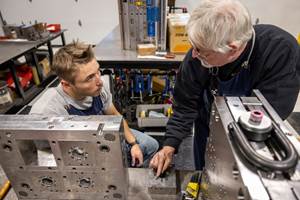Right in Your Own Backyard
You don't always have to venture very far to find the right opportunities.
During a visit to the West Coast late last year, I met with representatives from one of MMT’s longtime supporters, Edro Specialty Steels. After some talk about technology and industry trends, the conversation turned toward a new apprenticeship program that the company was instituting in its Conshohocken, Pennsylvania, facility. Now, while I was familiar with Edro’s Walnut, California, location, where it manufactures mold bases, I was unaware of these steel-rolling operations just outside of Philadelphia, which happens to be right in my own backyard. Stranger still is that one of the apprentices they wanted me to meet lives up the street from me. What a small world!
This small-world theme continued as I met with two apprentices to get personal perspectives on their sales and technical apprenticeships. Turns out, Nick and Rob were friends before being hired by Edro. They both graduated last year from Penn State University’s materials science program as metallurgists. Rob had learned about the apprenticeship opportunity at Edro through an email soliciting candidates. Again, right in his own backyard. Three months after Rob applied and landed a technical apprenticeship position, Edro put a call out for a technical sales position. Immediately Rob thought of Nick, who was looking for a business role that would capitalize on his metallurgy background. This technical sales opportunity was right up his alley, and again right in his backyard.
I learned a lot that day about Edro’s apprenticeship program, which these two guys are not only enjoying, but also actually are helping to craft as they advance through it. Individual apprenticeship plans are used as guidelines, but all apprentices must become familiar with the four main production areas: saw cutting, material layout, machining and heat treatment. All dates, timing and contents of the various stages of the plans are subject to change as the apprentice works through the program. Weekly reviews and quarterly progress reports help to identify strengths, weaknesses and interests, which are essential to formulate future training plans, as well as to assist in each candidate’s permanent job placement at Edro at the conclusion of the apprentice training program. It is up to the apprentice to accelerate and decelerate each training segment, so regular open communication and input is critical.
Mike Guscott manages this new apprenticeship program. He has long had a passion for training the next-generation workforce, starting with when he helped develop a program at Edro’s sister company, Bohler-Uddeholm, after which he modeled the Edro program.
Both Rob and Nick praise the program for allowing them to learn the steel business step by step, in a very hands-on environment. There is structure to the program, but independent learning and thinking is strongly encouraged. Almost immediately after starting, Rob was tasked with studying and evaluating existing plate heat-treatment procedures. Working through various times and temperatures, he was able to propose slight modifications that have since been implemented. These changes have reduced the number of re-treats, improving efficiency and helping to ensure consistent hardness uniformity in every plate produced. “We started doing stack loading where we load multiple plates in a furnace to get good uniform results,” he says. He also came up with documented procedures based on his time and temperature results. Since Nick came on board, he says he has experienced intensive sales training, building his confidence for outside sales, and has assisted with solving a customer’s plate issue. Not only are these apprentices proving out the effectiveness of the program, they are helping to craft it, and that’s allowing Edro to get the best from each of them.
Rob and Nick are content staying local but are also intrigued by the opportunities Edro offers through its family of companies. In five years, Rob wants to be contributing a lot more to global production, possibly overseeing it, to a degree, and Nick has his eyes set on management. Whatever their end goals, both agree that this program is structured to help them find appropriate areas for themselves and get the training to excel. “Just find out what you like to do and go for it,” Nick advises.
The lesson learned here is: Don’t overlook opportunities in your own backyard.
Related Content
Hands-on Workshop Teaches Mold Maintenance Process
Intensive workshop teaches the process of mold maintenance to help put an end to the firefighting culture of many toolrooms.
Read MoreThe Role of Social Media in Manufacturing
Charles Daniels CFO of Wepco Plastics shares insights on the role of social media in manufacturing, how to improve the “business” side of a small mold shop and continually developing culture.
Read MoreEden Tool and Eden Manufacturing: A Story of Resilience, Growth and Innovation
This critical parts manufacturer, founded on solid tooling fundamentals, didn’t get derailed with the unexpected passing of the owner because leadership was already building a solid business, not just a good tool shop. Here’s how they managed change incrementally… and they’re not finished yet.
Read MoreMaking Mentoring Work | MMT Chat Part 2
Three of the TK Mold and Engineering team in Romeo, Michigan join me for Part 2 of this MMT Chat on mentorship by sharing how the AMBA’s Meet a Mentor Program works, lessons learned (and applied) and the way your shop can join this effort.
Read MoreRead Next
MoldMaking Matters: Your Career Can Make a Difference
Watch the Video: This recruitment tool highlights careers in moldmaking and is designed to attract the next generation of workers.
Read MoreHow to Use Strategic Planning Tools, Data to Manage the Human Side of Business
Q&A with Marion Wells, MMT EAB member and founder of Human Asset Management.
Read MoreReasons to Use Fiber Lasers for Mold Cleaning
Fiber lasers offer a simplicity, speed, control and portability, minimizing mold cleaning risks.
Read More






















